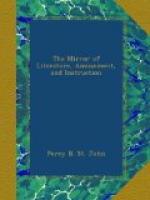There is not an accomplishment in the mind of a female more enchanting, nor one which adds more dignity and grace to her person, than constancy. Whatever share of beauty she may be possessed of, whether she may have the tinge of Hebe on her cheeks, vying in colour with the damask rose, and breath as fragrant—and the graceful and elegant gait of an Ariel—still, unless she is endowed with this characteristic of a virtuous and ingenuous mind, all her personal charms will fade away, through neglect, like decaying fruit in autumn. The whole list of female virtues are in their kind essential to the felicity of man; but there is such beauty and grandeur of sentiment displayed in the exercise of constancy, that it has been justly esteemed by the dramatic poets as the chief excellence of their heroines. It nerves the arm of the warrior when absent from the dear object of his devoted attachment, when he reflects, that his confidence in her regard was never misplaced; but yet, amidst the dangers of his profession, he sighs for his abode of domestic happiness, where the breath of calumny never entered, and where the wily and lustful seducer, if he dared to put his foot, shrunk back aghast with shame and confusion, like Satan when he first beheld the primitive innocence and concord between Adam and Eve in the Garden of Eden. It adds a zest to the toils of the peasant, and his heart expands with joy and gratitude when he returns in the evening to his ivy-mantled cottage, and finds his wife assiduously engaged in the household duties of his family. And it soothes the mind of the lunatic during the lucid intervals of the aberration of his intellects, and tends more than anything else to restore him to reason. In fact, there is no calamity that is incident to man, but that female constancy will assuage. Whether in sickness or health, in prosperity or poverty, in mirth or sadness, (vicissitudes which form the common lot of mankind in their pilgrimage through this life;) the loveliness of this inestimable blessing will shine forth, like the sun on a misty morning, and preserve the even temperature of the mind. To the youthful lover it is the polar star that guides him from the shoals and quicksands of vice, among which his wayward fancy and inexperience are too apt to lead him. But in the matrimonial state, the pleasures arising from the exercise of this virtue are manifold, as it sheds a galaxy of splendour around the social hemisphere; for it is such a divine perfection, that Solomon has wisely observed, that
“A virtuous woman is a crown to her husband.”
A husband so blessed in marriage, might exclaim with the lover in one of Terence’s comedies, “I protest solemnly that I will never forsake her; no, not if I was sure to contract the enmity of mankind by this resolution. Her I made the object of my wishes, and have obtained her; our dispositions suit; and I will shake hands with them that would sow dissension betwixt us; for death, and only death, shall take her from me.”




